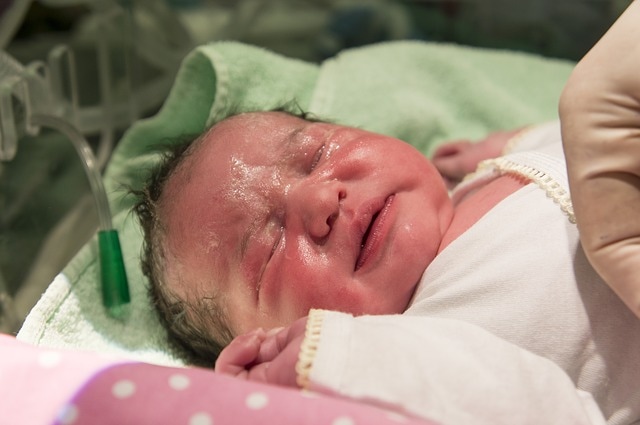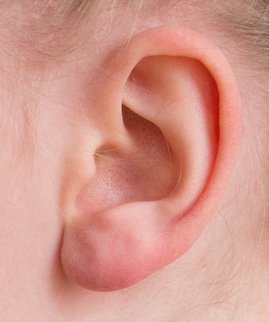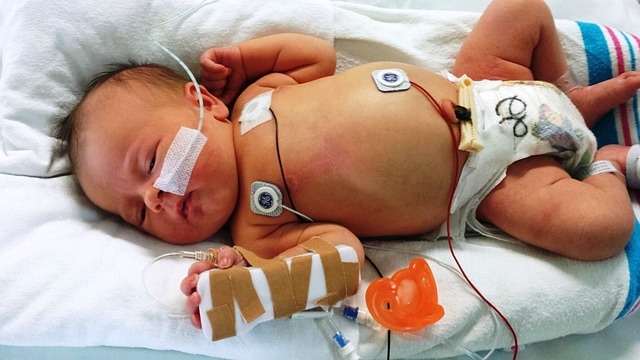The best doctor in the world is the veterinarian. He can't ask his patients what is the matter-he's got to just know.
This quote is also true about neonatologists (doctors for newborns) and pediatricians. They, too, "just have to know".
Likely, every parent agrees. Remember when our babies were just born and screaming and couldn't tell us where it hurt and how much it hurt? That was one of the most helpless feelings of our lives. After all, aren't we primed to protect them? They were counting on us and we had no idea what to do or even what was wrong.
I asked him to explain. However, his explanation proved my point. Here's what he said:
Babies have short Eustachian tubes that are tilted upwards. They collect fluid.
What? He never fully explained his reasoning and when I made my point, he said, "Sounds reasonable". I left feeling very confused.
Here was my reasoning: The tubes are short and tilted upward. When babies teethe, a tremendous amount of saliva is created in response to their swollen, hot gums and with their immature oral motor skills, babies don't manage their saliva efficiently. It floods their mouths. It does not flow out of the tubes and down their throats. It builds up and an infection sets in.
Because the Eustachian tubes connect the middle ear to the back of the throat and because many teething children develop middle ear infections (otitis media), it seems likely that there's causation somewhere in this equation.
Because they can't talk, not only it is hard to tell when babies are in pain, but their pain is more easily overlooked.
Doctors and parents both rely on clues to guess whether or not a baby is in pain. Babies cry, scream, flail, arch their backs, and show facial grimacing in response to pain. But, they can also cry, wiggle and grimace when they are hungry or want to be held.
The pain that infants experience has long been ignored or at least misunderstood, but until recently, it has not been at the top of the list for study or management. It's not pretty. We parents know what it's like to live with an infant in pain. We can use all of the help we can get.
I remember when our son was teething several large teeth and a great deal of gum tissue had to be pierced and displaced by those sharp teeth in order for them to completely erupt. I was delirious with sleep deprivation and concern for my child when I showed up at the pediatrician's office (about 28 1/2 years ago) and demanded that the baby get some relief. He was miserable. Fevered, sweating with stress and in serious pain.
The pediatrician gave me a prescription for liquid Tylenol with codeine. I gave it to baby only at night. Everyone needed rest in order to deal with the painful symptoms during the day. It worked well and I was careful about minding the potential for constipation. I guess this medication was the modern mother's version of Scotch on the fingertips rubbed on the angry gums. The medication, along with cold teething rings and Momma rubbing the gums with a frozen washcloth did the trick. We survived.
The ear infections were yet another story. As a clinician, I was well aware that kids who had frequent ear infections were vulnerable to developing serious language processing disorders. We now know that children with 5 diagnosable infections before the age of 7 are at particular risk.
For every ear infection with symptoms that required treatment, I always wondered how many "subclinical" ear infections they experience. Kids can have fluid in their middle ears without accompanying fever and pain, so it goes undetected. However, the fluid distorts the perception of sounds which can manifest in sound-symbol association (phonemic competence) resulting in language disorders, reading and written language achievement deficits. I saw this "connection" very, very frequently during assessments. Actually, I have at least two different books focusing on the relationship between ear infections and language processing and academic disorders.
We parents need to push for more research and frankly, interest in these areas. I think the fact that kids grow out of this helpless state fairly quickly is a strike against those of us who think it's important to help infants who are in pain.
We're just doing the best we can, Claudia
Join me on Facebook at Dr. Claudia McCulloch






